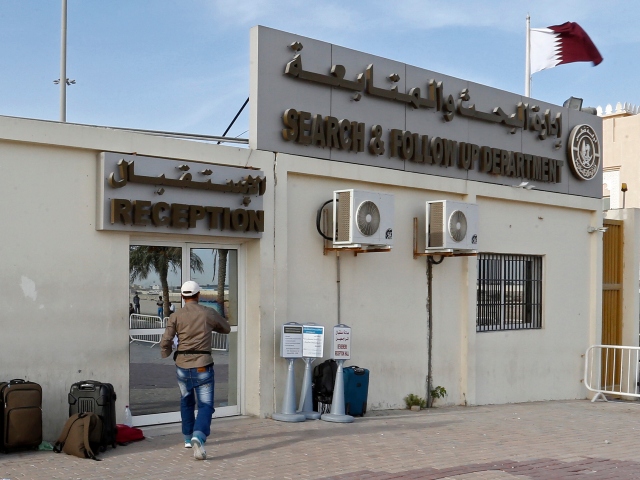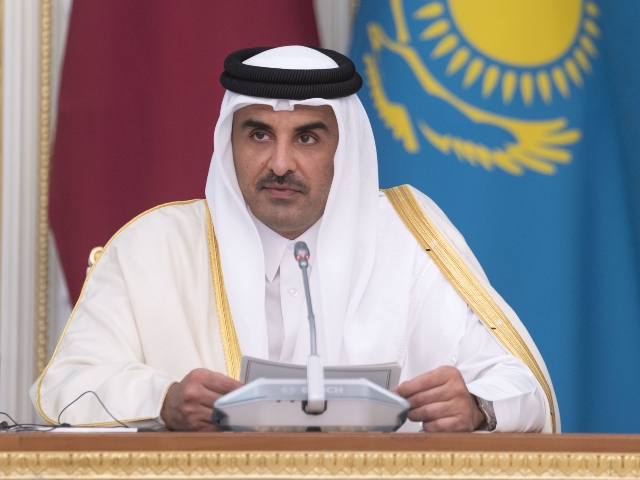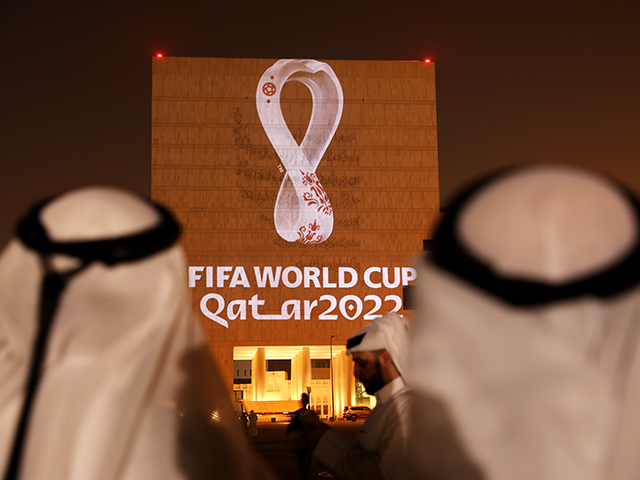Authorities in Qatar intercepted a live broadcast on Tuesday evening by Danish television reporter Rasmus Tantholdt, in the country to cover the upcoming FIFA World Cup, and appeared to physically threaten him and his film crew, going so far as to threaten to smash their camera.
The assault, caught on video, does not appear prompted by anything Tantholdt or his team were doing. A group of apparent government authorities drove up to Tantholdt mid-broadcast in a golf cart, got out, and began hassling his cameraman. The footage aired on Denmark’s TV2 appears to show a struggle over the camera while an outraged Tantholdt tries to explain that the network received formal accreditation to broadcast in the country.
The incident echoes a similar dispute during the 2022 Winter Olympics in Beijing, where Chinese Communist Party thugs intercepted a benign sports broadcast by Dutch journalist Sjoerd den Daas and physically dragged him off-screen. The Chinese government never fully explained the reason for the attack, but Chinese state media claimed den Daas had “failed to show his identity card” and that the attack was “reasonable and justified.”
Unlike the Olympics incident, multiple Qatari government agencies have issued apologies to Tantholdt and TV2. The incident nonetheless brings to the fore years of concerns that the repressive Sharia-governed state was a poor choice for hosting one of the world’s most prestigious sporting events, as players, journalists, and spectators would face potential human rights violations for inadvertently angering the authoritarian leadership there.
Human rights activists have also condemned Qatar over the widespread evidence of abuses against foreign workers used to build World Cup facilities, who faced sometimes deadly, slave-like conditions in which the government did not act to protect their rights or physical integrity. For incoming visitors, Qatar also presents threats in the form of its aggressive persecution of LGBT people. Survivors of police abuse say that Qatari authorities use “catfishing” schemes to identify – then torture and rape – suspected gay people, most often men.
Qatari authorities have dismissed criticism of its rampant disrespect for human rights as racist. FIFA, the international soccer institution that runs the World Cup, has described the event in Qatar as a “celebration of unity and diversity.”

Qatar has faced constant criticism of its treatment of workers since winning the right to host the 2022 football World Cup. (STRINGER/AFP via Getty Images)
Tantholdt published the full video of his exchange with Qatari authorities on Tuesday, which did not appear to show the journalist or his crew obstructing roads or causing any visible disturbance. A group of men in a golf cart drive up to Tantholdt and abruptly begin to harass the crew, appearing to stick a piece of cloth over the camera’s lens to prevent it from recording.
“You invited the whole world to come here, why can’t we film? It’s a public place,” Tantholdt tells the men in English. The journalist appears to take out his documentation showing the Qatari government granted his crew permission to film, but it does not stop the men – who are yet to be identified at press time – from threatening to destroy the camera.
“You can break the camera, you want to break it? You are threatening us by smashing the camera?” Tantholdt can be heard saying.
Tantholdt confirmed that Qatari authorities apologized for the incident. The Qatari Supreme Committee for Delivery & Legacy later issued a statement to Western reporters – not available on its official website or social media pages at press time – apologizing to the Danish team and claiming that government thugs had “mistakenly interrupted” the crew.
“Upon inspection of the crew’s valid tournament accreditation and filming permit, an apology was made to the broadcaster by on-site security before the crew resumed their activity,” the statement clarified, adding that the government had “issued an advisory to all entities to respect the filming permits in place for the tournament.”
It remains unclear at press time which government entities’ officers interrupted the broadcast.
As with the Qatar World Cup, the International Olympic Committee (IOC) faced global disgust for granting hosting duties this year to China, a country currently committing genocide that was likely to violate the rights of journalists, athletes, and spectators traveling to the country for the event. Less than half a year before the Winter Olympics began, the Chinese government disappeared tennis champion Peng Shuai after she publicly accused a top Chinese Communist Party Olympic committee official, Zhang Gaoli, of raping her. The IOC helped the Chinese government cover up her disappearance, claiming to have spoken to her and verified her safety.
Dutch journalist Sjoerd den Daas faced a similar situation in Beijing to that seen in Qatar this week, whisked out of sight of the cameras suddenly by Chinese regime thugs. The man conducting the seizure wore a band that read “public safety volunteer,” indicating he was not a police officer.
Den Daas’ network, Nederlandse Omroep Stichting, later clarified that the journalist was safe and later allowed to finish the broadcast. The Chinese government appeared to blame den Daas for being harassed.
“The fact is that the reporter had entered an area where Beijing police had notified on Thursday that it would be under temporary control during the opening ceremony of the Olympic Games,” the Chinese Global Times government newspaper claimed. “In face of security guards, the reporter failed to show his identity card and kept escalating the incident. Apparently, the security guards’ ‘intrusion’ was both reasonable and justified.”
Nervous free-state governments have repeatedly warned prospective World Cup travelers to avoid a wide variety of behaviors so as to not anger the host country.
“Importing drugs, alcohol, pornography, pork products, and religious books and material into Qatar is illegal,” the United Kingdom warned travelers in a message on Monday. “Swearing and making rude gestures are considered obscene acts, and offenders can be jailed and/or deported. Take particular care when dealing with the police and other officials.”
Qatar World Cup ambassador Khalid Salman angered human rights activists last week in an interview with a German broadcaster in which he answered a question about persecution of LGBT people in the country.
“I am not a strict Muslim,” he said, “but why is it haram? Because it is damage in the mind.”
Handlers appeared to abruptly shut down the interview once Salman attributed being gay to brain damage.
Emir of Qatar Sheikh Tamim bin Hamad al-Thani complained a month ago that fears of human rights abuses in his country were unfair and bigoted.
“Since we won the honor of hosting the World Cup, Qatar has been subjected to an unprecedented campaign that no host country has ever faced,” Sheikh Tamim said.

Qatari Emir Sheikh Tamim bin Hamad Al-Thani (Photo by Qatari Emirate Council / Handout/Anadolu Agency via Getty Images)
“Every year, Pride Month during June is a celebration for the LGBTQIA+ community, as well as an opportunity to peacefully protest and raise political awareness of current issues,” a statement from FIFA read. “This year, FIFA will deliver the greatest celebration of football the world has ever seen – and the first global gathering of sports fans since the pandemic.”
The World Cup would be, it continued, “a celebration of unity and diversity – a joining of people from all walks of life – regardless of race, ethnicity, religion, age, disability, sex characteristics, sexual orientation, gender identity and expression.
“Everybody will be welcome,” FIFA promised.
“Everyone is welcome [at the World Cup] regardless of origin, background, religion, gender, sexual orientation or nationality,” Gianni Infantino, the president of FIFA, said last week, an apparent response to concerns about abuses of women or LGBT people at the tournament.
Qatari officials have rejected all human rights concerns and complaints, going as far as to brand them racist.
“Since we won the honor of hosting the World Cup, Qatar has been subjected to an unprecedented campaign that no host country has ever faced,” the emir of Qatar, Sheikh Tamim bin Hamad al-Thani, declared in late October.
Ethically challenged former FIFA President Sepp Blatter, who ran the organization when Qatar won hosting rights for 2022, said publicly this week that allowing the country to host was a mistake, but claimed the problem with the situation was that Qatar was simply too small a country to successfully run the event.
“Football and the World Cup are too big for that,” he said in an interview on Tuesday, taking “responsibility” for the decision and stating it would have been “a gesture of peace” for America to host instead of Qatar, following Russia’s 2018 hosting.
“It is ironic when this tone is struck in countries in Europe that call themselves liberal democracies. It honestly sounds very arrogant and very racist,” Foreign Minister Sheikh Mohammed bin Abdulrahman al-Thani proclaimed.
Qatari officials have been dismissing World Cup concerns as racism since at least 2015.

COMMENTS
Please let us know if you're having issues with commenting.